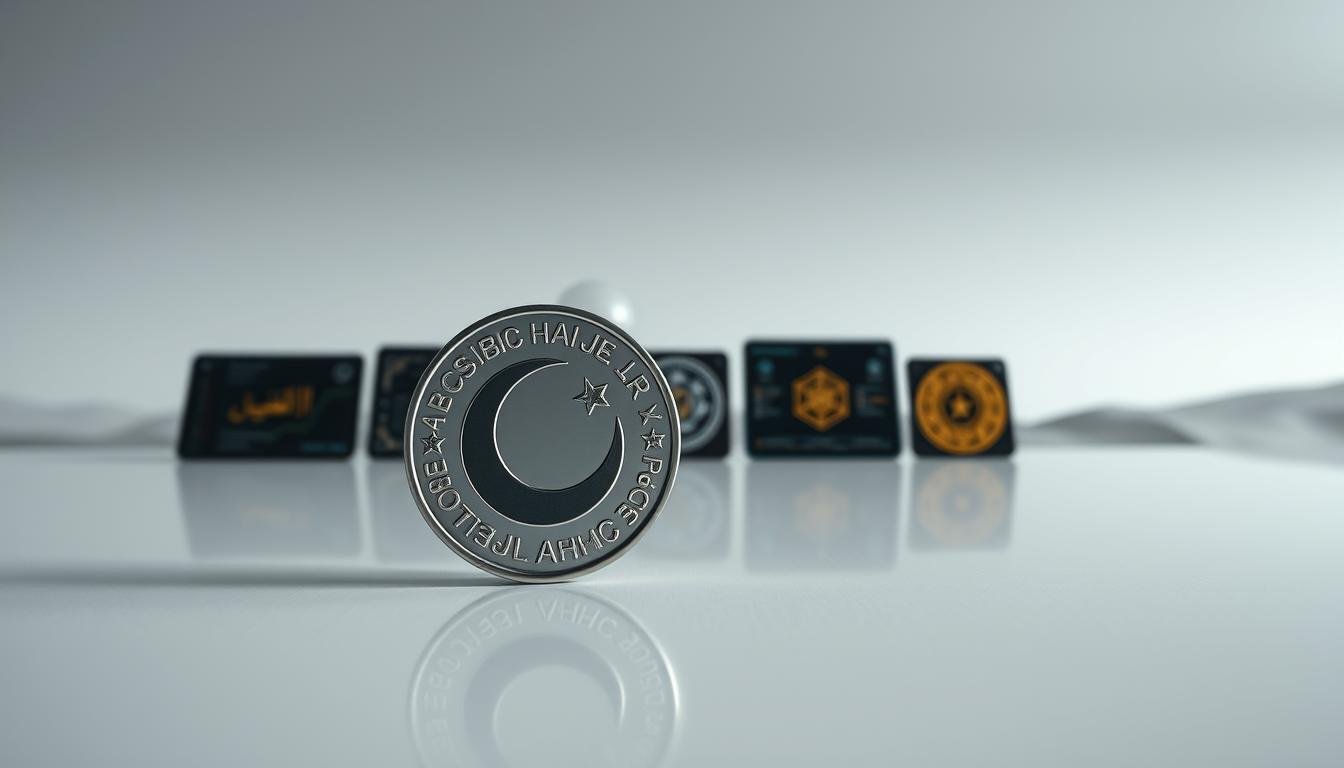The global Islamic finance market is expected to surpass $3 trillion by 2024. This rapid expansion has drawn Muslim investors to the digital realm of cryptocurrencies. They seek opportunities that resonate with their ethical and religious beliefs. Consequently, a Halal Cryptocurrency List has emerged, highlighting Shariah compliant crypto options for ethical investing. These cryptocurrencies align with Islamic principles, allowing investors to leverage blockchain technology while upholding their faith. This article delves into the intricacies of halal investing in cryptocurrencies and the significance of ethical finance in the digital economy.
Whether you are an experienced investor or embarking on your financial journey, grasping the principles of Shariah compliant crypto is empowering. It enables you to make informed choices, positively impacting your financial future.
Key Takeaways
- The Islamic finance market is rapidly expanding, with a projected value of over $3 trillion.
- Halal investing in cryptocurrencies allows Muslims to participate in the blockchain revolution while adhering to Islamic principles.
- A Halal Cryptocurrency List helps identify Shariah compliant crypto options for ethical investing.
- Ethical finance ensures that investments align with personal and religious values.
- Understanding the principles behind halal investing is crucial for making informed financial decisions.
Understanding Halal Cryptocurrency
The rise in digital assets necessitates grasping the fundamentals of halal cryptocurrency. For those interested in Halal Cryptocurrency Investments, adhering to Islamic finance laws is paramount. Recognizing what constitutes a halal cryptocurrency enables Muslims to invest ethically and responsibly.
What Makes a Cryptocurrency Halal?
Several criteria are pivotal in determining a cryptocurrency’s halal status. Islamic principles, such as transparency and the prohibition of haram activities like gambling and interest, are fundamental. Key aspects include:
- Compliance with Sharia law: The underlying business model should not involve any prohibited activities.
- Transparency: Clear understanding of how the cryptocurrency operates promotes trust.
- Utility: The cryptocurrency must serve a legitimate purpose that benefits society.
Key Principles of Halal Investing
Halal investing is guided by principles that resonate with Islamic values. These principles instill integrity and responsibility among investors. Some of them include:
- Social justice and welfare.
- Risk-sharing instead of risk-transfer.
- Ethical business practices and community contributions.
The Importance of Ethical Finance
Ethical finance is crucial in creating a positive financial environment. By supporting Islamic Finance Cryptocurrencies, investors contribute to the expansion of Shariah Approved Digital Assets. This not only upholds Islamic values but also fosters a sustainable economic future.
Top Halal Cryptocurrency Options on the Market
The realm of cryptocurrency presents a plethora of opportunities for Cryptocurrency for Muslims aiming to adhere to Islamic tenets. It is crucial to discern the halal status of various coins to make informed investment choices. We delve into some prominent options currently available.
Bitcoin and Its Halal Status
Bitcoin, the pioneering cryptocurrency, has incited considerable debate regarding its compliance with Islamic finance. Many scholars concur that Bitcoin’s primary function as a digital currency aligns with Islamic principles. Its decentralized nature positions it favorably for those pursuing Halal Blockchain Tokens. However, it is imperative for investors to be aware of the differing opinions among scholars.
Ethereum: A Closer Look
Ethereum distinguishes itself through its pioneering smart contract technology, enabling the creation of decentralized applications. This feature positions Ethereum as a prime contender among Islamic Crypto Coins. Its adaptability in supporting diverse blockchain initiatives may appeal to Muslim investors interested in ethical ventures. By grasping Ethereum’s compatibility with Shariah law, investors can integrate it into their portfolios with confidence.
Lesser-Known Halal Cryptos to Consider
For those venturing beyond Bitcoin and Ethereum, several lesser-known cryptocurrencies also meet halal criteria. Below are a few worth examining:
- Cardano (ADA) – Renowned for its emphasis on sustainability and research-driven development.
- Ripple (XRP) – Engineered for international payments, boasting low transaction fees.
- Stellar (XLM) – Focused on facilitating cross-border financial transactions.
Investors in search of Halal Blockchain Tokens must meticulously evaluate these projects’ alignment with Islamic principles. Leveraging resources such as reliable financial platforms can aid in the analysis of these cryptocurrencies.
Evaluating the Halal Status of Cryptocurrencies
Assessing the halal status of cryptocurrencies necessitates a meticulous examination of several factors. The emergence of Shariah Compliant Crypto has heightened investor awareness regarding the imperative of thorough research. Key considerations for evaluating Halal Cryptocurrency Investments are outlined below.
Researching Projects for Compliance
Investors must conduct an in-depth analysis of a cryptocurrency project’s operational structure. This inquiry should encompass the technology, mission, and potential risks. It is paramount to verify that the project adheres to the principles of Islamic Finance Cryptocurrencies. Transparency in the project’s objectives and operational methods is crucial, fostering trust and aligning with ethical investment standards.
The Role of Shariah Advisory Boards
Shariah advisory boards are instrumental in verifying the halal status of cryptocurrencies. These boards comprise scholars well-versed in Islamic finance and law. Their task is to scrutinize projects against Shariah principles, ensuring they do not engage in prohibited activities or derive income from illicit sources. An endorsement from a respected Shariah advisory board significantly enhances the credibility of any cryptocurrency investment.
Tools and Resources for Investment Analysis
Employing appropriate tools and resources is vital for making well-informed decisions regarding Halal Cryptocurrency Investments. Diverse analytical platforms and databases offer insights into the compliance status of various cryptocurrencies. Metrics such as community engagement, development activity, and market performance are also crucial for understanding potential investments. Essential resources include:
- Shariah compliance analytics tools
- Market research reports
- Investment forums focused on Islamic finance
How to Build a Halal Cryptocurrency Portfolio
Constructing a balanced halal cryptocurrency portfolio necessitates employing various strategies that adhere to Islamic finance principles. Investors must prioritize methods that not only comply with ethical standards but also manage risk effectively. This section elucidates essential strategies for crafting a robust portfolio within the realm of Halal Investments.
Diversification Strategies
Diversification is paramount in mitigating investment risk. By dispersing investments across a spectrum of cryptocurrencies, the likelihood of substantial financial loss diminishes. Below are some effective diversification tactics:
- Invest in multiple assets within the Halal Cryptocurrency List.
- Mix large-cap cryptocurrencies with smaller, emerging options.
- Consider geographic diversity by investing in international tokens.
Risk Management in Crypto Investments
Grasping the fundamentals of risk management is crucial in the unpredictable realm of cryptocurrencies. Adopting robust risk management practices safeguards your investment capital amidst market fluctuations. Key strategies encompass:
- Setting clear investment goals and limits.
- Using stop-loss orders to minimize potential losses.
- Regularly reviewing and adjusting your portfolio for optimal performance.
Monitoring Market Trends and News
Staying abreast of market trends and news is imperative for Halal Investments. Relying on credible sources facilitates informed decision-making. Recommended actions include:
- Subscribing to industry newsletters and analysis platforms.
- Joining forums and online communities focused on halal investing.
- Participating in webinars and events featuring experts in the field.
The Future of Halal Cryptocurrencies
The landscape for halal cryptocurrencies is rapidly evolving, presenting promising opportunities for investors mindful of ethical finance. Emerging technologies and regulatory changes are shaping the realm of Halal Cryptocurrency Investments, poised for considerable growth. Innovations such as advanced blockchain systems and decentralized finance (DeFi) platforms could significantly enhance the potential for Shariah Compliant Crypto. This paves the way for more robust investment options in the coming years.
Emerging Technologies and Innovations
Technological advancements are at the forefront of enhancing the viability of Islamic Finance Cryptocurrencies. Innovations within blockchain technology aim to improve transparency, security, and transaction speeds. These improvements could play a crucial role in establishing more trust and credibility within the Halal Cryptocurrency market. Furthermore, developments in smart contracts may facilitate better automation and compliance tracking, ensuring adherence to Shariah principles.
Regulatory Changes Affecting Halal Assets
Changes in regulations could also impact how halal assets are categorized and governed. Governments and regulatory bodies are increasingly recognizing the importance of halal investing, leading to clearer guidelines. This shift may result in more structured frameworks for investors, offering greater security and support for Halal Cryptocurrency Investments. As these regulations evolve, they will likely contribute to a safer and more established environment for Islamic Finance Cryptocurrencies.
Community Perspectives on Halal Investing

Community insights are vital in grasping the evolving realm of halal investing, especially with the rise of Islamic Crypto Coins. Interactions with both experts and investors unveil a spectrum of viewpoints. These address the legitimacy and potential of Halal Blockchain Tokens.
Insights from Islamic Finance Experts
Islamic finance experts underscore the necessity of strict adherence to Shariah principles in cryptocurrency evaluation. They note the sector’s innovation is opening up avenues for ethical investing. The conversation around Cryptocurrency for Muslims reveals a growing understanding of its risks and benefits.
Experts caution that with thorough research, halal cryptocurrency choices can foster financial growth sustainably. This growth occurs without compromising on ethical standards.
Experiences of Muslim Investors
Muslim investors recount varied experiences within the halal cryptocurrency market. Many feel empowered by the ability to invest in line with their faith. Others highlight the hurdles of managing volatility and verifying authenticity in available options.
Discussions within the community show that participating in Halal Blockchain Tokens offers more than financial gains. It also strengthens a dedication to ethical finance.
Practical Steps to Start Investing
Embarking on the journey of Halal Cryptocurrency Investments is an exhilarating venture for Cryptocurrency for Muslims. By adhering to practical steps, individuals can make informed, ethical investment choices. This guide outlines essential steps to initiate your investment journey, including selecting an exchange, setting up a wallet, and executing your first transaction.
Choosing the Right Exchange
The selection of a reputable exchange is paramount for trading Shariah Approved Digital Assets. Opt for platforms that specifically support halal assets and provide transparent information on their compliance with Islamic principles. Look for user-friendly interfaces, robust security measures, and positive reviews from other investors.
- Check for halal certifications and approval.
- Verify the exchange’s security protocols.
- Compare transaction fees and exchange rates.
Setting Up Your Wallet
After selecting an exchange, the next step involves setting up a secure digital wallet for storing your Cryptocurrency for Muslims. The choice of wallet is critical for safeguarding your investments. Hardware wallets offer superior security, while software wallets are more convenient for daily transactions.
Making Your First Transaction
Executing your first investment transaction may seem daunting, but with a clear plan, it becomes manageable. Start by funding your account on the chosen exchange. Once your account is funded, navigate to the section for purchasing Shariah Approved Digital Assets. Specify the amount and complete the purchase. Always review the transaction details before confirming.
For additional guidance on managing your investments, feel free to check privacy policies associated with the platforms you choose.
Challenges and Considerations
Investing in cryptocurrencies comes with unique hurdles, especially when focusing on Halal Cryptocurrency List options. It’s crucial to grasp these challenges for those interested in Shariah Compliant Crypto. Addressing volatility, scams, and Shariah conflicts is key. This enables investors to navigate the complex landscape effectively, employing robust Risk Management strategies.
Volatility in Cryptocurrency Markets
The cryptocurrency market is known for its swift price fluctuations. Investors must be ready for this volatility. Crafting a clear strategy for entering and exiting positions is vital. Tools like stop-loss orders can help manage losses during downturns. Keeping abreast of market trends aids in making timely decisions.
Misleading Claims and Scams
The growth of cryptocurrency has led to an uptick in misleading claims and scams. Investors must conduct thorough research before investing. Verifying a cryptocurrency’s inclusion in a Halal Cryptocurrency List through research and reviews is essential. Engaging with credible sources and expert opinions can protect against fraudulent schemes. Resources like this guide can increase awareness of common pitfalls.
Conflicts with Shariah Principles
Financial decisions must align with Shariah principles. Some cryptocurrencies may inadvertently conflict with these guidelines. It’s crucial to verify that a cryptocurrency adheres to ethical financing standards before investing. Engaging with community discussions and consulting with Islamic finance experts can help clarify any potential conflicts. Continuous education is essential for successful Risk Management in this field. For further assistance, individuals can explore pertinent information at this resource.
Educational Resources for Investors

For those exploring Halal Cryptocurrency Investments, access to quality educational resources is crucial. Grasping the basics of Islamic finance and keeping up with cryptocurrency advancements is vital for making informed choices. This section offers essential recommendations across various mediums.
Books and Articles on Halal Finance
Exploring reputable books and articles can greatly improve understanding of Islamic Finance Cryptocurrencies. Seek out titles that delve into the intricacies of halal investing and present case studies of successful projects. Experts in Islamic finance offer insights into compliance and ethical standards. Online platforms abound with guides and articles dedicated to Halal Cryptocurrency Investments.
Online Courses and Workshops
Online courses and workshops specifically focus on halal investing. They cover essential topics like ethical finance principles, investment strategies, and cryptocurrency use. These programs not only enhance knowledge but also offer opportunities for networking. Many platforms provide detailed curricula on Islamic finance and its application in cryptocurrencies. Our Educational Resources section highlights opportunities for both beginners and experienced investors.
Engaging with Investment Forums
Investment forums and community groups offer an interactive learning environment for Islamic Finance Cryptocurrencies. These platforms facilitate discussions, experience sharing, and diverse viewpoints on halal investments. Engaging in these conversations provides insights into market trends and ethical considerations. Interacting with seasoned investors broadens knowledge and promotes collaborative learning in Halal Cryptocurrency Investments.
Halal Investments Beyond Cryptocurrency
Investing ethically opens up a world of opportunities beyond cryptocurrencies. Finance enthusiasts delve into Ethical Investing that meets Shariah standards. They seek out Islamic mutual funds, real estate, and stocks that adhere to these guidelines. These options allow for portfolio diversification while upholding personal values.
Other Ethical Investment Options
Islamic mutual funds and real estate investments are viable alternatives to traditional investments. Investors might consider:
- Islamic mutual funds that invest solely in Shariah compliant sectors.
- Real estate ventures, which offer tangible asset backing and community benefits.
- Stocks from companies that adhere to ethical standards and Shariah principles.
These choices support sustainable growth and social responsibility. They align with the principles behind Shariah Compliant Crypto and Halal Blockchain Tokens.
Comparing Halal Cryptocurrencies to Traditional Assets
Halal cryptocurrencies differ significantly from traditional assets. Traditional investments may offer stability, but Halal cryptocurrencies present unique prospects. Investors may find:
- Greater volatility in the cryptocurrency market compared to traditional stocks.
- Innovative growth opportunities through blockchain technology.
- A chance to participate in a new financial landscape shaped by ethical considerations.
The evolution of Halal investment options continues to expand. It offers exciting opportunities for those interested in conventional and decentralized finance.
The Role of Technology in Halal Finance
Technological advancements are transforming the realm of halal finance. The introduction of blockchain and smart contracts is reshaping how we participate in Halal Cryptocurrency Investments and Islamic Finance Cryptocurrencies. These innovations boost transaction efficiency and guarantee compliance with Shariah principles.
Blockchain and Transparency
Blockchain technology offers a decentralized ledger, enhancing transparency and trust in financial dealings. This aligns with Islamic finance’s ethical standards. Each transaction on the blockchain is unalterable and traceable, preventing fraud and ensuring the integrity of Shariah Approved Digital Assets. Thus, investors can engage in Halal Cryptocurrency Investments securely, knowing their transactions adhere to Islamic principles.
Smart Contracts: A New Frontier
Smart contracts automate and enforce agreements, eliminating the need for intermediaries. This innovation simplifies the execution of contracts in Islamic Finance Cryptocurrencies. By ensuring code compliance with Shariah law, smart contracts mitigate the risk of disputes. Investors can use this technology to develop efficient financial solutions that adhere to ethical standards. The integration of smart contracts into halal finance heralds new opportunities for Shariah Approved Digital Assets, opening up innovative investment avenues.
Staying Informed about Halal Investments
Keeping abreast of the latest in halal investing is crucial for those venturing into Shariah compliant crypto. This ensures investors can seize new opportunities and sidestep potential risks. Reliable news sources, financial blogs, and platforms focused on halal finance offer indispensable insights. For a thorough grasp of halal investing, explore resources specifically designed for cryptocurrency enthusiasts within the Muslim community.
Recommended News Sources
Noteworthy among news sources are websites like Zoya Finance, which provides extensive information on halal investments. Following prominent bloggers and vloggers in the halal finance sphere can also broaden your knowledge. These individuals offer updates on the halal cryptocurrency list and ethical evaluations of digital assets.
Networking within the Halal Finance Community
Engaging with peers who share your interest in halal investments can greatly enhance your understanding. Participate in seminars, conferences, and webinars on Islamic finance to meet others with similar interests. Such interactions not only offer support but also stimulate discussions on innovative strategies and collective insights. This collective approach can significantly improve your investment strategy in this rapidly evolving field.
